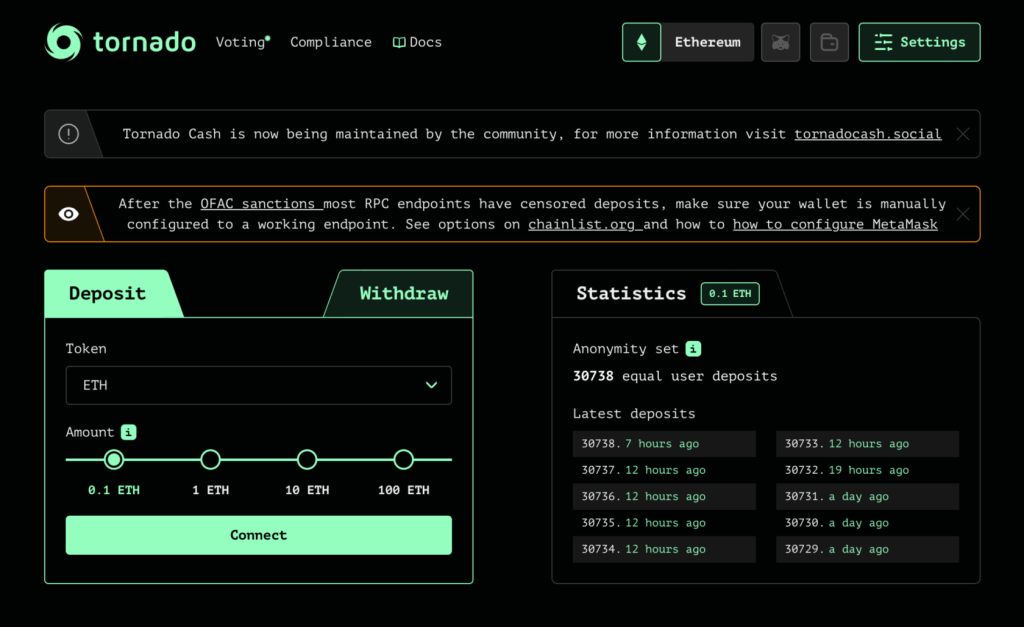Since its inception in 2019, Tornado Cash has played a crucial role in offering transactional privacy on Ethereum and other EVM-compatible blockchains. This is amidst growing concerns over privacy on the blockchain due to the increased adoption of decentralized finance (DeFi), a new paradigm where intermediaries are removed and users have direct control of their assests.
However, such innovation in privacy has not come without challenges. Most notably, the U.S. Treasury sanctions have had an impact on Tornado Cash, placing it in the spotlight and raising questions about the future of privacy in the cryptocurrency sector.
This guide delves deep into the world of Tornado Cash in 2024, exploring its technology, impact, and the controversies surrounding it. Whether you’re a seasoned crypto enthusiast or new to the scene, this comprehensive overview will equip you with everything you need to know about Tornado Cash in 2024.
Table of Contents
Understanding Tornado Cash
What is Tornado Cash?
Tornado Cash is a decentralized protocol that enhances transaction privacy on the Ethereum blockchain. It uses a clever technique known as a “mixer” or “tumbler” to obscure the origins and destinations of cryptocurrency transactions. By pooling funds together and then withdrawing them to new addresses, Tornado Cash breaks the on-chain link between the sender and receiver, thereby providing anonymity.
The Evolution of Tornado Cash
Over the years, Tornado Cash has undergone several updates to improve its functionality and user experience. Most notable is the launch of Tornado Cash Nova, an improved version still in beta that offers more flexibility to users by allowing both arbitrary amounts and shielded transfers.
Being fully decentralized, updates to the protocol have always been governed by a decentralized autonomous organization (DAO). Any proposed updates will have to go through a voting system by the community using the $TORN token.
How Tornado Cash Works
At its core, Tornado Cash utilizes a cryptographic method called zero-knowledge proofs, specifically zk-SNARKs (Zero-Knowledge Succinct Non-Interactive Argument of Knowledge), to allow users to deposit and withdraw funds anonymously. When a user deposits cryptocurrency into Tornado Cash, they receive a secret hash. To withdraw the funds, the user submits a proof generated from this hash, without revealing the original deposit, thus maintaining complete anonymity.
Tornado Cash and Cryptocurrency Privacy

The Importance of Privacy in Cryptocurrency
In the digital age, privacy has become a scarce commodity, especially in the realm of financial transactions. Cryptocurrencies initially promised a degree of anonymity, but the transparency of blockchain technology means that transactions are often traceable. Tornado Cash addresses this gap by providing a solution that ensures transaction privacy, allowing individuals to exercise their right to financial privacy. In a world where financial surveillance is on the rise, the importance of such tools cannot be understated.
Comparing Tornado Cash with Other Privacy Solutions
Tornado Cash is not the only privacy-focused solution in the cryptocurrency space. Alternative solutions like Monero and Zcash offer privacy features through different mechanisms, such as stealth addresses and zk-SNARKs, respectively. However, Tornado Cash stands out due to its non-custodial nature and compatibility with Ethereum, the leading platform for DeFi applications. Unlike privacy coins which require using a specific cryptocurrency, Tornado Cash allows users to maintain privacy through native tokens like ETH or BNB on EVM-compatible chains.
Legal and Ethical Considerations

Navigating the Legal Landscape
The rise of Tornado Cash and similar privacy-preserving technologies has prompted regulatory bodies around the world to take notice. The primary concern from a legal standpoint is the potential for such technologies to be misused for money laundering or financing illicit activities. As a result, Tornado Cash has faced scrutiny and, most notably, sanctions from the U.S. Treasury. These legal challenges highlight the delicate balance between privacy and regulatory compliance in the digital age.
Ethical Implications of Privacy Coins
The ethical debate surrounding Tornado Cash and privacy coins centers on the fundamental right to privacy versus the societal need to prevent illegal activities. Advocates for privacy argue that financial transactions, like other forms of personal communication, should be confidential. Critics, however, worry about the potential for abuse. The discussion is complex, with valid points on both sides, but it underscores the importance of finding a middle ground that respects individual privacy while safeguarding against misuse.
U.S. Treasury Sanctions on Tornado Cash

Understanding the U.S. Treasury Sanctions
In a landmark move, the U.S. Treasury imposed sanctions on Tornado Cash in response to concerns that the platform could be used for money laundering and to finance other illicit activities. These sanctions represent a significant moment in the ongoing dialogue between the need for financial privacy and the requirement for regulatory oversight. The sanctions aimed to restrict access to the protocol, citing its use in various illegal transactions as the primary rationale.
Impact of Sanctions on Tornado Cash and Its Users
The imposition of sanctions had immediate effects on Tornado Cash and its user base. Access to the platform was restricted for U.S. citizens, and several associated cryptocurrency addresses were blacklisted, effectively freezing assets connected to those addresses. This move sparked widespread debate within the cryptocurrency community about the implications for privacy, the decentralization of finance, and the future of cryptocurrency regulation.
Legal Ramifications and the Crypto Community’s Response
The crypto community’s response to the sanctions was swift and multifaceted. Many viewed the U.S. Treasury’s actions as an overreach that threatened the foundational principles of privacy and decentralization inherent in cryptocurrency. Legal experts and privacy advocates raised concerns about the precedent such sanctions could set for the regulation of decentralized protocols. Despite these challenges, Tornado Cash and its supporters have continued to advocate for the importance of privacy in the digital realm, exploring legal avenues to contest the sanctions and seeking ways to ensure the platform’s continued operation.
The Founders of Tornado Cash and Their Current Status

The Minds Behind Tornado Cash
Tornado Cash was developed by Roman Semenov, Alexey Pertsev, and Roman Storm. These individuals are also founders a firm PepperSec that focuses on cybersecurity. Despite the allegations against them since the protocol was sanctioned, most agree that their contributions have been pivotal in advancing the conversation around financial privacy and the technical possibilities of achieving it on the blockchain.
Aftermath of the Sanctions for the Founders
The U.S. Treasury’s sanctions have had a significant personal and professional impact on the founders of Tornado Cash. Alexey Pertsev, for instance, faced legal challenges directly related to his involvement with the project. These events have not only affected the individuals personally but have also sparked a broader discussion about the rights of developers and the legal responsibilities associated with creating decentralized financial tools.
The Crypto Community’s Support
In response to the challenges faced by the founders, the cryptocurrency community has rallied in support, highlighting the importance of solidarity in the face of regulatory pressure. Fundraisers, legal defense funds, and public advocacy campaigns are just a few examples of how the community has come together to support them. This collective response underscores the community’s commitment to defending the principles of privacy and decentralization.
Using Tornado Cash Post Sanctions
Adapting to the New Landscape
The sanctions imposed on Tornado Cash have necessitated adjustments both by the platform itself and its users. Despite the legal challenges, Tornado Cash continues to operate, showcasing the resilience and adaptability of decentralized protocols.

Users have become more cautious in various aspects. For example, relying only on official links and employing enhanced privacy measures whenever depositing or withdrawing. This period has also witnessed an increased focus on the protocol’s decentralized governance model, aiming to make the platform even more resistant to external pressures.
Strategies for Users and Investors
For users and investors navigating the post-sanctions environment, several strategies have emerged:
- Official Channels: Stay safe by relying only on official community presences across the web, such as tornado.community, the IPFS web UI, and Tornado Cash’s official Telegram group.
- Due Diligence: Understanding the legal implications of using privacy-focused tools and staying informed about regulatory changes.
- Privacy Best Practices: Employing advanced privacy measures, including the use of VPNs and secure wallets.
- Community Engagement: Participating in discussions and initiatives aimed at supporting privacy rights and advocating for sensible cryptocurrency regulation.
Despite the challenges, the future of Tornado Cash and similar decentralized privacy tools appears robust. Innovations continue to emerge, aiming to enhance privacy while addressing regulatory concerns. The conversation around privacy and regulation is evolving, with some viewing the challenges faced by Tornado Cash as an opportunity to establish clearer guidelines for the development and use of privacy-preserving technologies in the cryptocurrency space.
The Future of Tornado Cash
Upcoming Developments in 2024
Looking ahead to 2024, Tornado Cash is poised for further developments aimed at enhancing its stability and user experience through its decentralized governance model. In line with its original vision, the community remains committed to innovation and achieving on-chain privacy, indicating a bright future for the platform.
Tornado Cash’s Place in the Future of Privacy and Finance
Despite the sanctions, Tornado Cash remains the de-facto tool for achiveving transactional privacy on EVM-compatible chains. Such robustness ensures that the protocol remains well-positioned to play a significant role in shaping the future landscape of blockchain privacy as discussions around privacy and finance continue to evolve. The challenges and successes of Tornado Cash will undoubtedly shape the development of future privacy tools and the regulatory frameworks that govern them.
Community and Support
Finding Help and Resources
The Tornado Cash community offers a wealth of resources for users seeking help and information. Official channels, community forums, and educational materials are readily available, providing guidance on everything from technical support to navigating the post-sanctions landscape. This robust community support network is a testament to the collaborative spirit that defines privacy advocation within the cryptocurrency world.
Contributing to Tornado Cash
For those looking to contribute to the development and promotion of Tornado Cash, numerous opportunities exist. From coding and security audits to advocacy and education, the Tornado Cash community welcomes support in various forms. Engaging with the project not only helps advance the cause of financial privacy but also contributes to the broader movement toward a decentralized and privacy-respecting financial system.
Conclusion
Most within the crypto space will acknowledge that Tornado Cash stands as a pivotal figure in the ongoing dialogue about privacy, technology, and regulation in the domain. Its journey from a privacy-preserving protocol to a symbol of the clash between innovation and regulation offers valuable insights into the challenges and opportunities of building a more private financial future. As we move forward, the legacy of Tornado Cash—marked by innovation, resilience, and community—will go a long way in influencing the evolution of privacy and decentralized finance in the digital age.